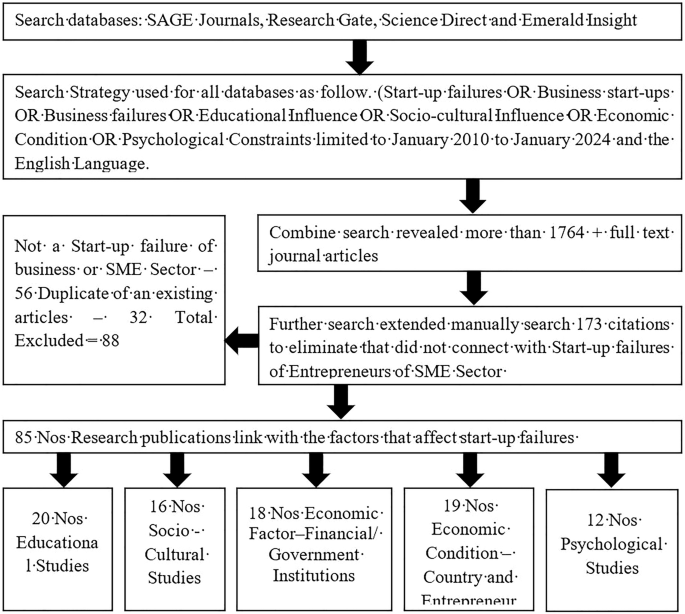Unveiling the challenges: exploring start-up hurdles faced by small and medium-sized enterprise entrepreneurs in Sri Lanka

In line with global research, such as Farrukh et al. (2019) and Crammond (2020), the findings from the Probit model confirm that educational attainment plays a pivotal role in entrepreneurial success within Sri Lanka’s SME sector. However, while these studies affirm the importance of education in fostering entrepreneurial capabilities, the unique context of Sri Lanka necessitates specific educational reforms, particularly in entrepreneurial skill development, to align with broader global trends. The analysis revealed that educational attainment significantly increases the probability of entrepreneurial success.
Regarding socio-cultural influences, the findings highlight the impact of family and religious leaders on entrepreneurship, consistent with the work of Chhokar (2013) and Dawson et al. (2015). Unique cultural factors specific to Sri Lanka, such as the role of the extended family in business decisions, provide additional insights into start-up failures. This outcome, however, diverges from findings in regions like Europe, where psychological factors, such as resilience and self-efficacy (Frese and Gielnik 2014), play a more prominent role. The lack of significance for psychological factors in Sri Lanka suggests a cultural divergence that warrants further exploration. This aligns with global research highlighting education’s critical role in fostering entrepreneurial capabilities (Cantner et al. 2021a).
The analysis reveals that socio-cultural and economic factors significantly influence SME failure rates, as evidenced by global and local studies (Chhokar 2013; Dawson et al. 2015). Specifically, the influence of family support, religious leaders, and access to financial institutions was found to be pivotal in determining business outcomes. Additionally, this study’s findings corroborate the work of Farrukh et al. (2019), which highlights the importance of entrepreneurial education while uncovering unique socio-cultural dynamics present in Sri Lanka.
While these results offer valuable insights into SME entrepreneurial success in Sri Lanka, it is essential to recognise the study’s contextual specificity. Given the unique socio-cultural and economic landscape of Sri Lanka, the findings may not be entirely generalisable to other regions. However, key factors, such as the role of education and socio-cultural support, may provide transferable insights for other developing countries with similar economic conditions. Furthermore, the mixed-method data collection approach allowed for a more comprehensive understanding of the factors influencing failure. The Probit regression analysis provided a robust statistical framework for evaluating the binary outcome of start-up success or failure, with the assumptions of the model thoroughly tested and met.
Further examination reveals that individuals with specific entrepreneurial and skills-based education exhibit a higher likelihood of business success. This impact spans from secondary education levels (O/L and A/L) to tertiary education, reflecting a broader trend that underscores the importance of adapting educational systems to better prepare individuals for economic transitions from developing to developed statuses (Kulasekara et al. 2016). Sri Lanka has a relatively high literacy rate compared to other South Asian nations, with significant literacy rates among both genders. The education system primarily focuses on rigorous examinations that are knowledge centric. However, this study underlines the critical need for incorporating job-oriented and entrepreneurial subjects at various levels of education to better prepare students for future economic challenges and opportunities (Central Bank of Sri Lanka, 2019). Feedback from research participants suggests integrating entrepreneurial and skills education from the school stage (O/L and A/L) through to university (Diploma or Degree). Such early exposure is believed to be foundational in reducing business failures by equipping individuals with essential entrepreneurial capabilities. Furthermore, a significant number of respondents acknowledged receiving education related to entrepreneurship during their school years, which likely aids in cultivating an entrepreneurial mindset early on (Premaratna and Jayasundara 2016).
The Sri Lankan government should recognise the strategic importance of entrepreneurship and skills development as a solution for youth unemployment and fostering economic growth. Despite the introduction of entrepreneurship courses at university levels, there is still limited research on the impact of these educational interventions on entrepreneurial intentions among students (Premaratna and Jayasundara 2016). It is acknowledged that introducing entrepreneurial studies into the academic curriculum from an early age is crucial for the development of entrepreneurial thinking and skills. Such educational strategies prepare students for future entrepreneurial activities and play a vital role in enhancing their career development relative to their fields of study (Cantner et al. 2021a). The relationship between education and entrepreneurial success is complex, with significant implications for economic growth, innovation, and job creation. Higher education levels correlate with improved entrepreneurial activity and business sustainability (Farrukh et al. 2019). Education also provides critical access to financial resources, markets, and networks, which are essential for navigating business challenges and seizing opportunities (Baker and Welter 2020).
Promoting entrepreneurship education is crucial to addressing socioeconomic disparities that affect access to quality education and entrepreneurial opportunities. Targeted financial support, positive thinking programmes, and community-based support are necessary to ensure comprehensive growth and development (Wurth et al. 2021). In summary, the importance of education as a determinant of entrepreneurial success in the SME sector is evidenced by empirical research and reinforced by stakeholder feedback. The findings emphasise the need for the systematic integration of entrepreneurship education across all educational levels in Sri Lanka. By incorporating both entrepreneurial and psychological skill development, in line with global best practices (Cantner et al. 2021b), such initiatives could significantly enhance entrepreneurial success and drive sustainable economic growth. However, further research is needed to determine the adaptability of these educational strategies to regions with differing socioeconomic conditions, along with support for business start-ups.
Socio-cultural parameters determine the societal and cultural factors that affect how individuals understand, think, and act. These influences, including child-rearing approaches and cross-cultural differences, play a significant role in shaping entrepreneurial behaviour. Socio-cultural factors such as ethnic values, cultural change, family structure, kinship systems, and regional diversity significantly impact entrepreneurial endeavours (Aldrich 1989).
Family support is considered an essential determinant of entrepreneurial success, providing emotional backing and valuable resources that facilitate business start-ups and resource mobilisation (Tuazon et al. 2018). In Sri Lanka, where family units are crucial to social norms, support from the family unit is vital. However, it is essential to recognise that family support and trust can vary widely across different cultures and social backgrounds, affecting entrepreneurial experiences in diverse ways (Daspit et al. 2021).
Furthermore, religious leaders and related communities worldwide provide significant support and guidance, influencing entrepreneurs’ values, ethics, and risk-taking propensities (Henley 2022). The cultural perception of entrepreneurship, deeply embedded within Sri Lankan society, significantly influences individuals’ attitudes towards risk, innovation, and business ownership (Welter 2011). In the absence of support from religious leaders, unsuccessful business start-ups may occur, as such guidance is essential. Additionally, religious leaders within the Muslim community provide substantial support for individuals to start and sustain their own businesses. This is a general observation we have derived from the research itself.
Sociocultural factors not only influence start-up success but also provide essential insights into various aspects of business, including strategies, decision-making processes, and market interactions (Moriano et al. 2012). These cultural factors are significant for understanding the entrepreneurial landscape and developing strategies that align with local cultural and social contexts. Socio-cultural factors intersect with other dimensions of the entrepreneurial ecosystem, such as access to finance, regulatory frameworks, and educational opportunities (Yoowoo Lee et al. 2023). Cultural attitudes towards risk and failure can impact entrepreneurs’ willingness to seek external funding or engage in innovative ventures. Integrating cultural values into entrepreneurship education programmes can enhance the development of an entrepreneurial mindset and foster creativity and resilience among aspiring entrepreneurs (Marina et al. 2014).
Financial barriers are significantly connected to business start-ups, with major issues including insufficient support from government institutions such as the Ministry of Finance or the Department of SME Development. Consequently, this leads to an inability to secure sufficient capital, a lack of government support, difficulties in obtaining business loans from banks, inadequate collateral for disadvantaged individuals, and insufficient cash flow to sustain operations (Olawale and Garwe 2009). These challenges highlight the critical need for supportive financial infrastructure to enable business expansion.
In Sri Lanka, most successful entrepreneurs receive assistance from the Sri Lankan banking system to support business start-ups in the SME sector or benefit from Micro Finance Systems, along with support from government initiatives. After engaging with economic development officers in Sri Lanka, it is evident that they strengthen the foundation for entrepreneurs. They tend to categorise the field and facilitate connections for their development. Many unsuccessful entrepreneurs did not receive adequate support from such institutions or personnel. These perceptions underscore the pivotal role that financial institutions play in providing essential support to nascent businesses, significantly influencing the start-up success rate (Udell and Berger 2002).
Furthermore, financial institutions provide more than just loans; they also offer advisory services, technical assistance, and networking opportunities with similar groups of entrepreneurs, which are crucial for the resilience and competitiveness of start-ups (group 2019). These mechanisms enhance the development of entrepreneurs by reducing the likelihood of failure and promoting sustainable development. Effective government policies and interventions are essential for developing the SME sector. Regulatory frameworks, credit guarantee schemes, and targeted funding initiatives have been shown to significantly improve entrepreneurs’ access to finance, particularly those in underserved markets (Mahmud et al. 2022).
In addition to the significant role of financial institutions, structural barriers persist, such as stringent collateral requirements, high interest rates, and bureaucratic procedures, which hinder SMEs’ ability to access formal financial services (Demirguc-kunt 2020). Therefore, it is essential to coordinate and communicate effectively with policymakers, financial regulators, and development agencies to promote inclusive financial systems that cater to the diverse needs of entrepreneurs in the SME sector.
The analysis confirms the significant influence of the economic conditions of the country and entrepreneurs on the success and failure rates of start-ups in the SME sector in Sri Lanka. Policymakers and stakeholders must consider these factors when designing strategies and policies to reduce start-up failures and promote sustainable entrepreneurial activity. This research elaborates on the idea that when economic conditions are favourable, customers may experience an increase in their purchasing power. Consequently, they will buy more from sellers, ultimately benefiting retail sellers, wholesale sellers, and manufacturers.
The results from the Probit model also highlight the significant impact of the economic conditions of both the country and entrepreneurs on start-up failures within the SME sector in Sri Lanka. Recent research underscores the influence of macroeconomic indicators on entrepreneurship. Favourable economic conditions, such as low inflation and stable GDP growth, positively affect entrepreneurial activity by reducing uncertainty and enhancing market opportunities (Wyrwich et al. 2016). These conditions create a conducive environment for start-ups by providing predictability and potential for growth.
The economic stability of the country and its entrepreneurs, coupled with supportive policies, is critical for nurturing entrepreneurial ecosystems that foster start-up success. Stable economic conditions ensure that entrepreneurs have access to necessary resources and a favourable market environment (Acs et al. 2018). The results of the Probit model align with comprehensive studies that emphasise the importance of access to finance, market demand, and a supportive regulatory environment as fundamental drivers influencing entrepreneurial behaviour and venture performance (Davidsson 2017). A robust economic framework facilitates better access to capital and market opportunities, which is essential for the sustainability of business start-ups for entrepreneurs in Sri Lanka.
The significant impact of start-ups is influenced by the economic conditions of the country and the entrepreneurs themselves. Therefore, policymakers and political groups within the governing body should aim to enhance the country’s economic conditions, improve access to finance, reduce bureaucratic barriers, and foster an innovation ecosystem. Additionally, governments can create an enabling environment for entrepreneurial ventures (Kerr et al. 2016). Such policies would support SMEs in achieving profitability and long-term growth, ultimately benefiting the entire country.
While economic conditions and stability are important, other contextual variables—such as the availability of human capital, technological infrastructure, and institutional support—also play crucial roles in determining entrepreneurial success (Urbano et al. 2019). These elements contribute to the overall development of the country’s economic conditions and those of entrepreneurs. When entrepreneurs have access to capital, they are more likely to invest in human capital and technological infrastructure, increasing their chances of success rather than failure. This unique study provides valuable insights into the interplay between the country’s economic conditions and start-up failures in the SME sector of Sri Lanka. By understanding the multidimensional nature of entrepreneurship and its dependence on macroeconomic factors, responsible institutions and personnel can be developed to support SMEs and enhance overall economic growth and development (Bubnovskaia et al. 2024).
Finally, this analysis of the dependent variable confirms that the economic conditions of the country and the entrepreneurs themselves significantly influence the success and failure rates of start-ups in the SME sector in Sri Lanka. As mentioned earlier, responsible government institutions and private entities must consider these factors when designing strategies and policies aimed at reducing start-up failures and promoting sustainable entrepreneurial activity.
Research has been conducted on the psychological factors influencing start-up entrepreneurship in Sri Lanka and other countries. However, findings suggest that factors such as overconfidence, optimism, fear of loss, negative attitudes, and cognitive biases play significant roles in start-up outcomes. Early studies on entrepreneurial traits from 1961 to 1990 showed minimal effects, which was unexpected given that venture capitalists and entrepreneurs often cite personal characteristics as major drivers of success (Aldrich and Wiedenmayer 1993; Baum and Locke 2004). Psychological factors, such as the fear of failure, were not statistically significant in this study, while the significant influence of psychological traits like resilience was noted (Frese and Gielnik 2014). The divergence in findings might reflect differences in the cultural or economic pressures facing entrepreneurs in Sri Lanka.
Recent research focusing on competence, motivation, cognition, and behaviour highlights a growing interest in psychology-based investigations into how these factors correlate with entrepreneurial success. The use of more intricate models and improved research methods has facilitated a deeper understanding of the impact of these traits on performance (Baum et al. 2011; Baum and Locke 2004; Mitchell et al. 2000).
Research conducted by Qudus et al. (2022) shows how psychological factors affect and influence entrepreneurs’ start-ups. Similarly, another study by Yan et al. (2023) found that while grit and perseverance are important for the survival of technology start-ups, these traits alone do not guarantee long-term success, indicating the importance of external factors in entrepreneurial outcomes. Further insights into psychological factors and entrepreneurship have been explored by Paul Vincent and Devi N (2018), who examined the relationship between psychological constraints, such as risk-taking propensity and self-efficacy among Indian entrepreneurs, noting their positive influence on entrepreneurial intentions but limited impact on actual start-up performance. While entrepreneurial passion and vision are crucial for the success of start-ups in Bangladesh, they are often hindered by institutional barriers and market conditions. This challenge in protecting the nation’s interests was also highlighted by Younggeun Lee and Herrmann (2021). In Sri Lanka, the education system also influences the motivation and positive thinking of entrepreneurs.
Comparative studies and meta-analyses conducted by Soomro and Honglin (2015) highlighted cross-cultural differences in entrepreneurial motivations between Chinese and American students, emphasising the significance of contextual factors. Tsai et al. (2020) provided evidence supporting the positive impact of psychological indicators such as optimism, resilience, and self-efficacy on entrepreneurial outcomes. They referenced a review by Frese and Gielnik (2014) that offered insights for both psychology and entrepreneurship research, suggesting theoretical frameworks for understanding entrepreneurial success. This integrative research indicates the need to consider psychological dimensions comprehensively within entrepreneurship research and practice.
Maydiantoro et al. (2021) examined the influence of self-assurance, overconfidence, and risk attitudes on entrepreneurial intention and performance in the UK, noting that while these factors shape intentions, their translation into performance is influenced by external variables. Rauch et al. (2009) demonstrated the importance of entrepreneurial orientation and its impact on business performance, highlighting the need for a combination of psychological attributes and strategic capabilities. Ali et al. (2023) explored how emotional stability and conscientiousness moderate the relationship between entrepreneurial failures and dynamic managerial capabilities, underscoring the role of psychological factors in fostering resilience and adapting to change. While the discussion has highlighted the strengths and implications of our findings, it is also crucial to consider the limitations of our study, which are addressed in the following section to provide a balanced view of our research scope and impact. Although the findings offer valuable insights into SME failures in Sri Lanka, the results may not be fully generalisable to other contexts due to the unique socio-cultural, economic, and educational environments. However, the role of entrepreneurial education and family support highlighted in this study may offer transferable insights for other developing countries with similar SME ecosystems.
link






